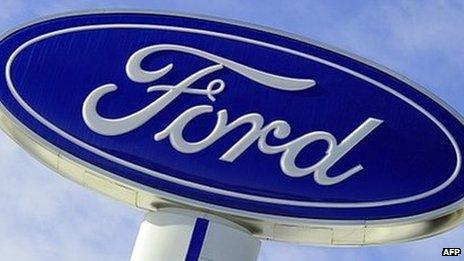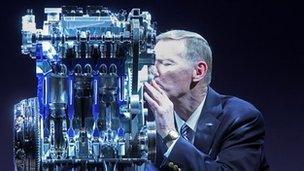Ford sets out on road to recovery
- Published

New models and structural changes will aim to knock the Blue Oval back into shape
The stubbornly persistent downturn in the European car markets is painful for Ford.
The American automotive giant's sales fell almost 10% in Europe during the first half of 2012, to its lowest level in 17 years.
But many other mainstream carmakers, including Opel/Vauxhall, Fiat and PSA Peugeot Citroen, are also feeling the pinch, as customers shift their allegiance to rivals such as the South Korean manufacturers Hyundai and Kia.
During the first six months of the year, Hyundai's sales rose 12% while Kia's rose 25%.
Improved efficiency
With its latest new products onslaught, Ford is clearly hopeful that improved versions of best-selling models such as Fiesta, Mondeo and Kuga will help bring back the buyers and revive its share price.
But fuel-saving technologies are also central to Ford's future.
The carmaker is introducing many technologies that help motorists monitor and thus reduce power consumption by driving more efficiently.
It is also improving the fuel economy of its conventional petrol and diesel-powered engines, with recent innovations such as the UK-developed 1.0 litre three-cylinder EcoBoost engine.
And it remains committed to further investment in technologies such as electric and petrol electric hybrid vehicles. Ford expects such cars to account for one in four sales globally by 2020.
Fixing Europe
But Ford's chief executive Alan Mulally also realises challenges beyond supply and demand must be addressed.
Fixing Europe has long been one his stated goals - one that has been reinforced by its predicted $1bn (£630m) loss in Europe this year.

Fuel-saving technology is central to Ford chief Mulally's efforts to revive the firm
Mr Mulally is eager to reduce labour costs and improve plant utilisation in Europe, where industry watchers say it uses less than 65% of its capacity.
Closing a factory in, say, Germany would go a long way to do this swiftly, but politically this is far from easy.
So instead, Ford is trying to get the unions and national politicians in Belgium, Germany, Spain and the UK to agree to structural changes.
These are deemed essential to square up to the South Koreans' modern, streamlined European operations in the Czech Republic and Slovakia, where production costs are much lower.
Uniform systems
Rather than merely adopting a brutal approach of sharp job cuts, however, Mr Mulally wants to change the way Ford builds cars.
As part of its "One Ford" strategy, external, the carmaker has come up with a global manufacturing system it wants to apply across all its factories, wherever they are in the world.
The system should not only help cut investment costs in its factories by 8% a year, but also make them much more flexible in terms of the range of models each factory would be able to manufacture.
This should help make the European factories better able to compete for future production work that would otherwise go to Ford's factories elsewhere in the world, where plants are newer and labour cheaper.
But hammering out a plan offers no guarantee of successful implementation. Successful negotiations with all stakeholders in Europe will be essential to ensure Ford of Europe's revival.